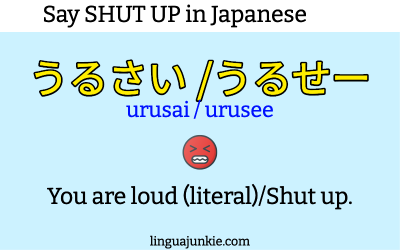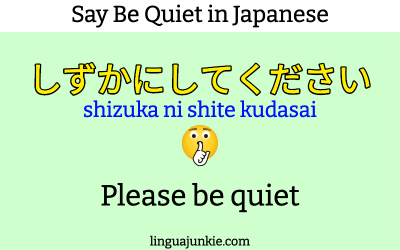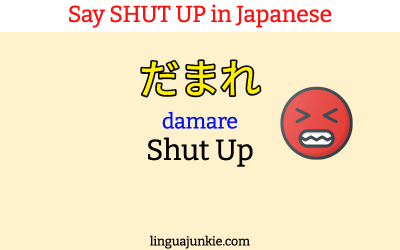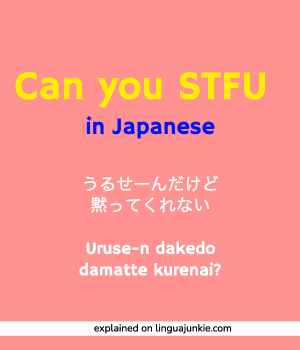There are a few ways you can say shut up in Japanese.
From very polite ways to very rude ways.
“Urusai” is one of them.
But in this guide, you will learn 4+ ways to say shut up in Japanese depending on the context along with romaji and translations. No kanji needed here. So, sit down, shut up, eat your vegetables… and read on, okay?
うるさい or うるせー
- Romanization: urusai / urusee
- Meaning: You are loud (literal)/Shut up.
- Differences? Read below.

The first way we will explore is うるさい (urusai) or うるせー (urusee).
Both versions of the word mean the same, “you are loud”, but うるせー is a more forceful way to say it. Within the context of a conversation, うるさい would be closer to mean “be quiet”, while うるせー would mean “shut up”.
| Listen to the phrase (press play) | |
| Urusai | Urusee |
There are variations of the words as well. For instance, you can say…. うるさいよ (Urusaiyo), which means “You are being loud”, or うるせーな (urusee na) which means “You are loud, shut up”.
- うるさいよ
- Urusaiyo
- You are being loud
- うるせーな
- urusee na
- You are loud, shut up”
Notice how urusai does not actually mean “be quiet”, instead, the literal translation is “loud”. The word can be used to describe a loud place, but the word can also mean “you are loud, be quiet” if you use the word directed at another person.
Here is an example of how the word can be used to describe a place that is loud.
- サム:このレストランうるさいね。 (kono restoran urusai ne.)
- Sam: This restaurant is loud, huh?
Now here is an example where the word is used to tell somebody to be quiet.
- 一郎:さっきからうるさいよ! (sakkikara urusaiyo!)
- Ichirou: You are constantly being too loud, be quiet!
As you can see from the above examples, the word is the same, and the literal meaning of the word is the same, but the connotation behind the word changes depending on the context you use it in.
You can also replace the うるさい in the examples with the うるせーvariant. As I have said before, this version of the word is a little more forceful, and people often use it when they are agitated.
So, replacing the word in the above examples will be:
- サム:このレストランうるせーな ! (kono restoran urusee na!)
- Sam: God, this restaurant is so loud!
- 一郎:さっきからうるせーな! (sakki kara urusee na!)
- Ichirou: You are constantly annoying, shut up!
As you can see, context is important, and just changing one word in the sentence can change the tone.
しずかにしてください
- Romanization: shizuka ni shite kudasai
- Meaning: Please be quiet
- Very polite/Formal

Another word people can use is しずかにしてください (shizukani shite kudasai). This is a polite way to ask somebody to be quiet in Japanese. The literal translation is “Please be quiet”. The word しずか (Shizuka) means “quiet”, and してください (shite kudasai) means “please do”.
This phrase is commonly used when addressing a stranger or a customer. It is important in Japanese culture to show respect to strangers, people older than you, or people that are your superior. If you ever find yourself needing to tell somebody to be quiet, this is the phrase you should choose.
Here is an example of how to use しずか on its own.
- サム:このレストランしずかだね。 (Kono resutoran Shizuka dane.)
- Sam: This restaurant it quiet.
Now let’s look at an example of how you can use しずかにしてください.
- 一郎:ここ図書館ですよ、しずかにしてください。 (koko toshokan desuyo, shizukani shitekudasai)
- Ichirou: This is a library, please be quiet.
In the above example, we can assume that Ichirou is either a patron at the library or the librarian, and he is asking a stranger to be quiet.
しずかに
- Romanization: Shizuka ni
- Translation: Be quiet.
- More informal than the above
It is not as common, but the above phrase can be shortened to make it more informal. Instead of しずかにしてください, we can say しずかに (Shizuka ni). The literal translation for this is simply, “be quiet”. As I mentioned before, ください (kudasai) roughly translates to, “please do”, and adding that at the end of sentences makes the sentence more polite and formal. By removing the phrase, we can make the sentence informal.
Here is an example:
- 一郎: テスト中はしずかに。 (tesutochuu wa shizukani.)
- Ichirou: Quiet during the exam.
In the above example, Ichirou is a test administrator telling the students to be quiet during the exam.
だまれ
- Romanization: damare
- Meaning: shut up

Ah, damare in Japanese… It’s probably THE most extreme way to tell somebody to hush the heck up. It’s also the closest you can say shut up in Japanese. People will often use this when somebody is loud and is agitating them. Although people can say…. だまってください (damatte kudasai) to make it slightly more formal, it is the same as saying, “please shut up”.
- だまってください
- damatte kudasai
- Please shut up.
Damatte kudasai may be polite, but you are still telling somebody to shut up. So, keep that in mind.
Here is an example of how you can use the word:
- サム: 映画に集中出来ない!だまれ! (Eiga ni shuuchuu dekinai! Damare!)
- Sam: I can’t concentrate on the movie! Shut up!
In the above example, Sam is trying to watch a movie, but others are being loud. Out of frustration, he is telling them to shut up. Alternatively, Sam could have made the sentence more formal by saying, 映画に集中出来ません!だまってください! (Eiga ni shuuchuu dekimasen! Damatte kudasai!) Either way, Sam is telling others to shut up, and he is making his frustration known.
The Worst Way Possible
- うるせーんだけど黙ってくれない
- Uruse-n dakedo damatte kurenai?
- Literally: You’re loud/noisy, can you shut up?
- Meaning: Can you stfu?
Let’s say damare in Japanese wasn’t enough for you and you want to put on the hurt. Well, why not combine “urusai” which you learned above” and “damare” together?
By the way, when you add the verb “kureru (kurenai in this case),” it mean you’re asking someone to do something for you. In other words, to shut up.

Read This Last!
Now you know how to say SHUT UP and BE QUIET in Japanese.
Wasn’t hard, right?
These are really fun phrases to know, just like bad Japanese words and angry Japanese phrases.
But, use words like damare and urusai at sparingly.
If you want to be polite, use shizuka ni shite kudasai.
– The Main Junkie
